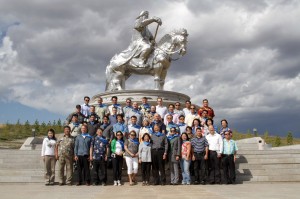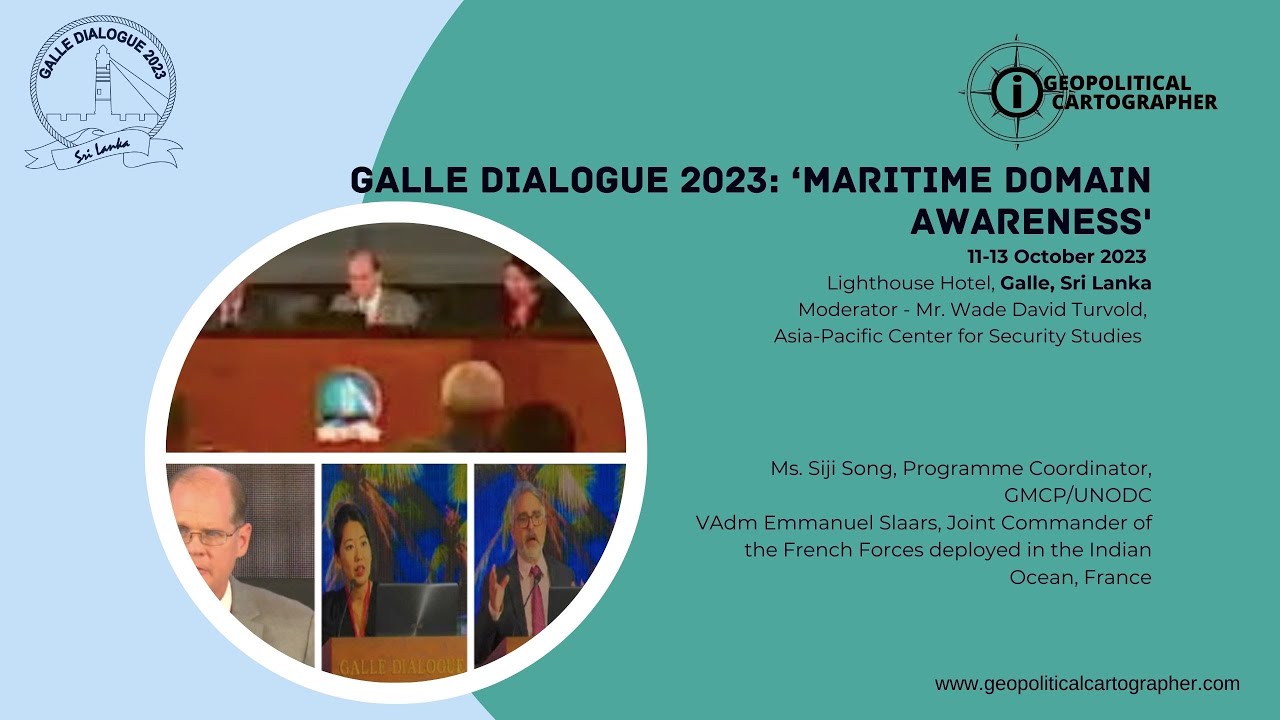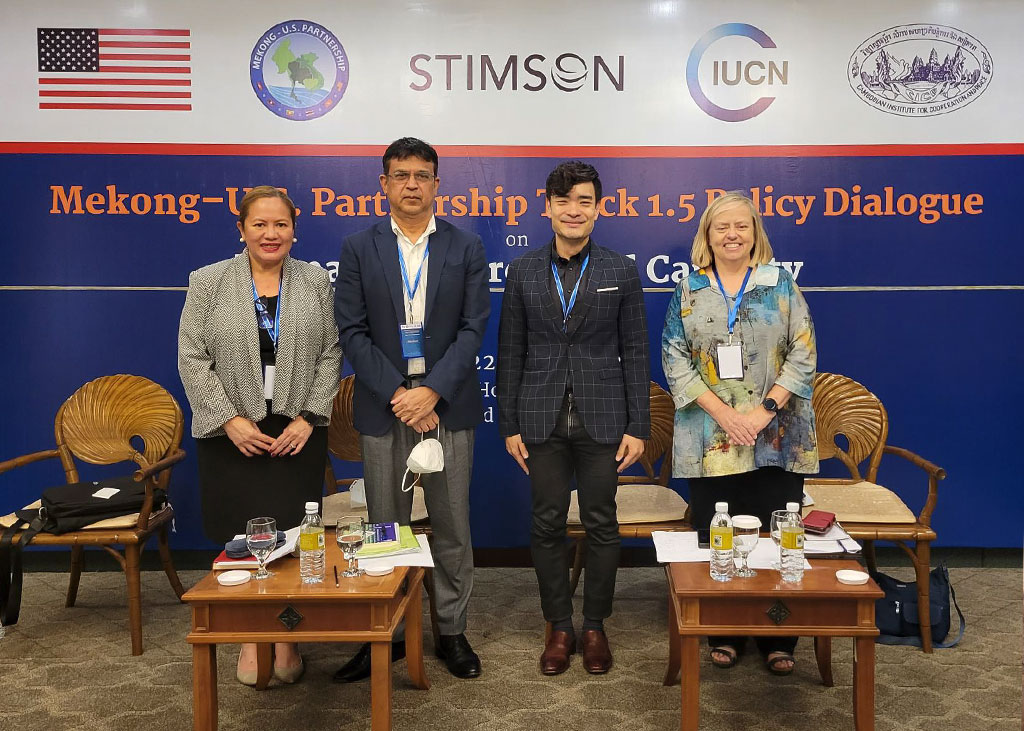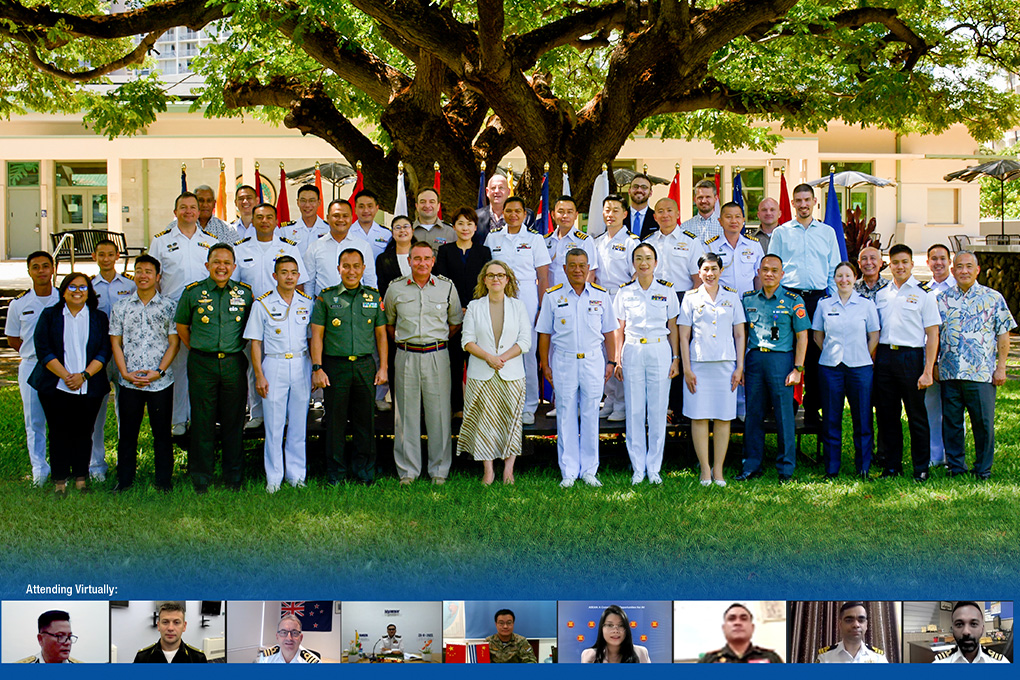 A four-day workshop in Ulaanbaatar, Mongolia entitled “Northeast and Central Asia Transnational Security Challenges: Ungoverned Spaces – Physical and Virtual” concluded Sept. 9 with synthesized group presentations intended to share best practices and open the way for future discussions on security issues.
A four-day workshop in Ulaanbaatar, Mongolia entitled “Northeast and Central Asia Transnational Security Challenges: Ungoverned Spaces – Physical and Virtual” concluded Sept. 9 with synthesized group presentations intended to share best practices and open the way for future discussions on security issues.
The Comprehensive Security Responses to Terrorism (CSRT) “mini-course” for continued engagement, education and connections was co-hosted by the Mongolian APCSS Alumni Association in partnership with Mongolian Institute for Strategic Studies and George C. Marshall European Center for Security Studies (GCMC).
Drawing from material of APCSS’ CSRT course and additional adjunct presentations, the course identified commonalities in security challenges among the participants through a broadened understanding of each nations and sub-regions issues related to the theme of “ungoverned spaces.”
In addition, the curriculum enhanced knowledge on the probabilities, vulnerabilities and impacts of the physical and virtual security environment. The course also enabled discussion and collaboration on regional and collective approaches to diminish, mitigate and defeat these security challenges. Finally, participants were empowered with collaborative tools to continue developing and nurturing networks through alumni engagement activities.
“The most valuable thing about this workshop was to be able to talk openly about some very sensitive issues, namely the historically significant and sensitive issues between China, Korea and Japan,” explained a workshop participant from Japan. “Now, we are standing on the same starting line with the same perspectives to move forward to the future together.”
In the last decade, the first of this millennium, globalization and technology have been a driving force in the convergence of transnational threats and networks, which are more dangerous and destabilizing than ever. These threats and networks have developed the sophisticated and adaptive ability to cross borders involving elements of organized and disorganized crime, exploit weak governance structures and the spaces that are ungoverned or ungovernable, particularly through illicit finance and trafficking in drugs, arms, goods and persons. The confluence of illicit trafficking with corruption has further facilitated the necessary environment for smuggling of terrorists, weapons of mass destruction (WMD) especially WMD materials and other dangerous weapons and technologies that threaten regional and global stability and security.
“I think this workshop is the most effective event I’ve ever had in my life because we actually worked on similar conditions,” said a workshop participant from Kyrgyzstan. “These recommendations are realistic and effective because our countries are facing the same problems with contemporary threats like terrorism, religious extremism, drug trafficking, human trafficking, and so on. This workshop gave all the participants the unique value of a common understanding of the threats, and gave us a chance to find new solutions. “
Additionally, these threats have crossed into the virtual spaces of our societies and economies to create new challenges in addressing the advancing vulnerability to exploitation by both the criminally motivated and the ideologically motivated.
The expansion of global interdependence continues to confront the ability of states to meet the expectations of governing the ‘spaces’ that fall within their responsibility in both physical and virtual dimensions. Across North Asia, the need to secure these spaces against the use for illicit means by criminal, financially motivated, and terrorist, ideologically or politically motivated, organizations is a growing challenge. The necessity of security practitioners across government and society to have a full understanding of the scope of the challenge and to identify ways for collaboration in order to effectively and more efficiently ‘raise the cost and reduce the benefit’ to both criminal and terrorist actors is critical to the collective regional and global security environment. Simply, transnational security challenges today in the 21st Century require collective security and transnational solutions to both mitigate and defeat.
“APCSS has given me a completely unexpected avenue of sharing best practices outside of the U.S. government,” revealed Robert Kosky, Jr., Supervisory Special Agent, Federal Bureau of Investigation. “Other foreign governments have been able to express not only best practices, but certainly their security concerns. I’ve been able to take those ideas back to the FBI and brief those either threats that other countries have seen, that maybe we haven’t seen.
“It’s been a big win for us in that regard,” Kosky continued. “It’s opened that window of opportunity to share back and forth beneficially. I’ve had the opportunity more than once this week to sit down with government officials who are working directly on some of the issues that we talked about. They’ve been able to ask my opinion directly. I’ve been able to ask them ‘what are your biggest concerns and ‘how is your government addressing this?’ To get it directly from those officials has been a profound, unique experience.”
Alumni from the United States, Mongolia, Japan, Republic of Korea, Peoples Republic of China, Hong Kong SAR, Russian Federation, Kazakhstan, Kyrgyzstan, Tajikistan, plus Regional perspectives from Shanghai Cooperation Organization, South Asia Association for Regional Cooperation and a subject matter expert on Southeast Asian cooperation.
“This event was unprecedented in the participation of Counterterrorism Fellowship Program (CTFP) alumni and other participants from across a wide representation of perspectives and experience that contributed to an enriched, candid and respectful discussion and debate on very real and critical challenges for all our nations,” stated Lt. Col. Michael S. Mollohan Sr., military professor and academic lead from APCSS. “The quality of the workshop was a direct reflection of those that took valuable time to come together in this unique framework and in a very short timeframe collectively develop innovative and realistic ways to move forward on addressing necessary policies to reduce the effects of transnational security issues across both domains discussed, physical and virtual. This was a step in the larger process and approach to regionally working together on common security interests and will continue beyond this workshop.”
“It was a special event for us, not only the entire APCSS Alumni here in Mongolia,” explained Col. Munkh-Ochir Dorjudger, Mongolian APCSS Alumni Association. “This year, we celebrate the centennial of our independence. This is something that is dear to the heart of every Mongolian. I would say we were able to look at the transnational security issues not from a narrow sub-regional perspective, rather from a bi-sub regional or bi-regional perspective. It’s in line with our foreign and very much in line with our regional policy. We are really lucky this time to bring expertise, knowledge and sharing of commons concerns from both sub-regions here in Ulaanbaatar.”
“Mongolia has been terrific,” concluded APCSS Acting Director Brig. Gen. (Ret.) James Hirai. “Since the APCSS was established in 1995, we’ve had the pleasure and honor of having nearly 150 Mongolian officials, from both the military and the civilian side of government, participate in our programs. These alumni have risen to levels of significance in the Mongolian government, to include the president of the country. We wanted to reinforce the good things Mongolians have been doing individually, and collectively.”
[nggallery id=23]









Leave A Comment